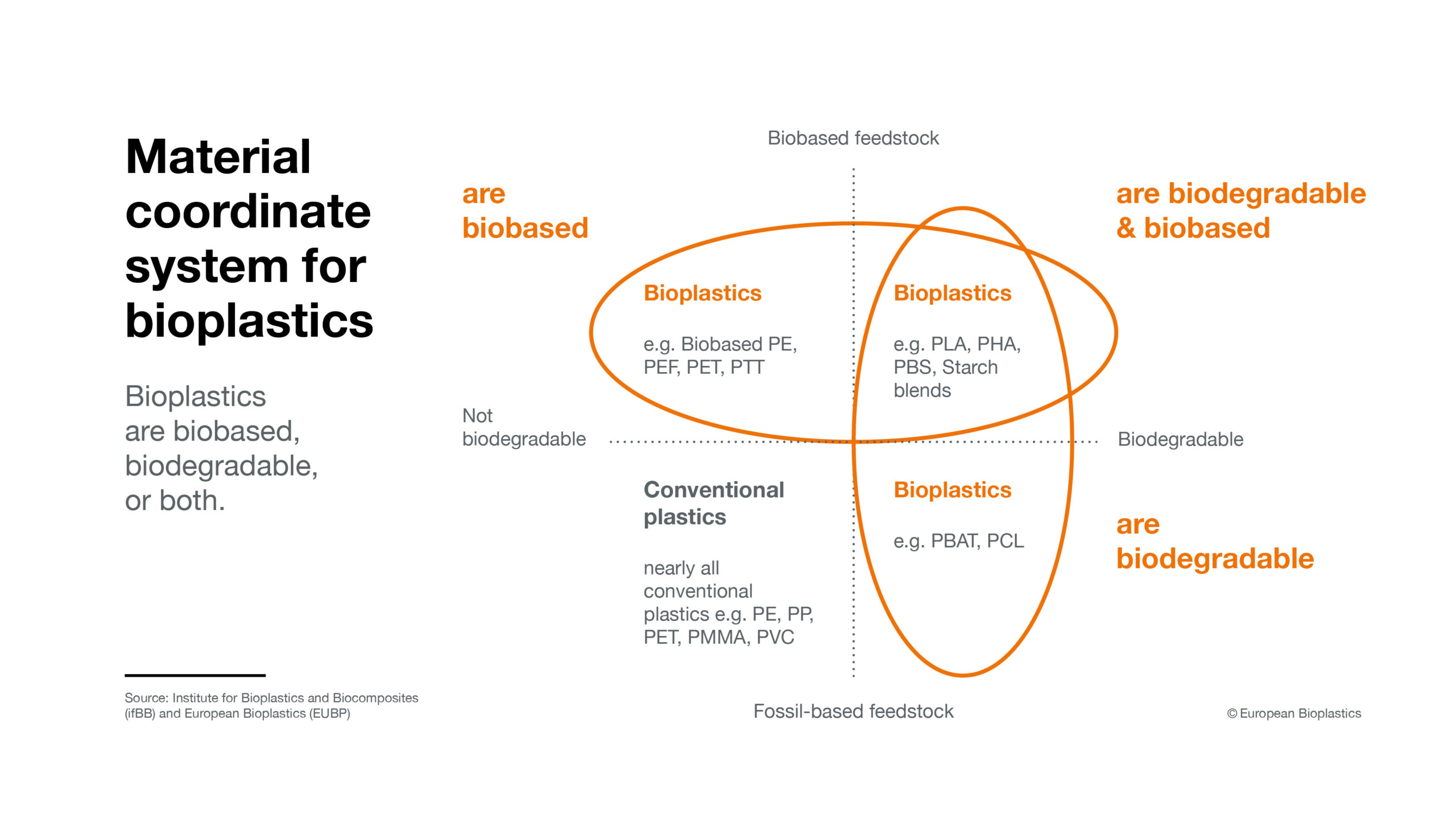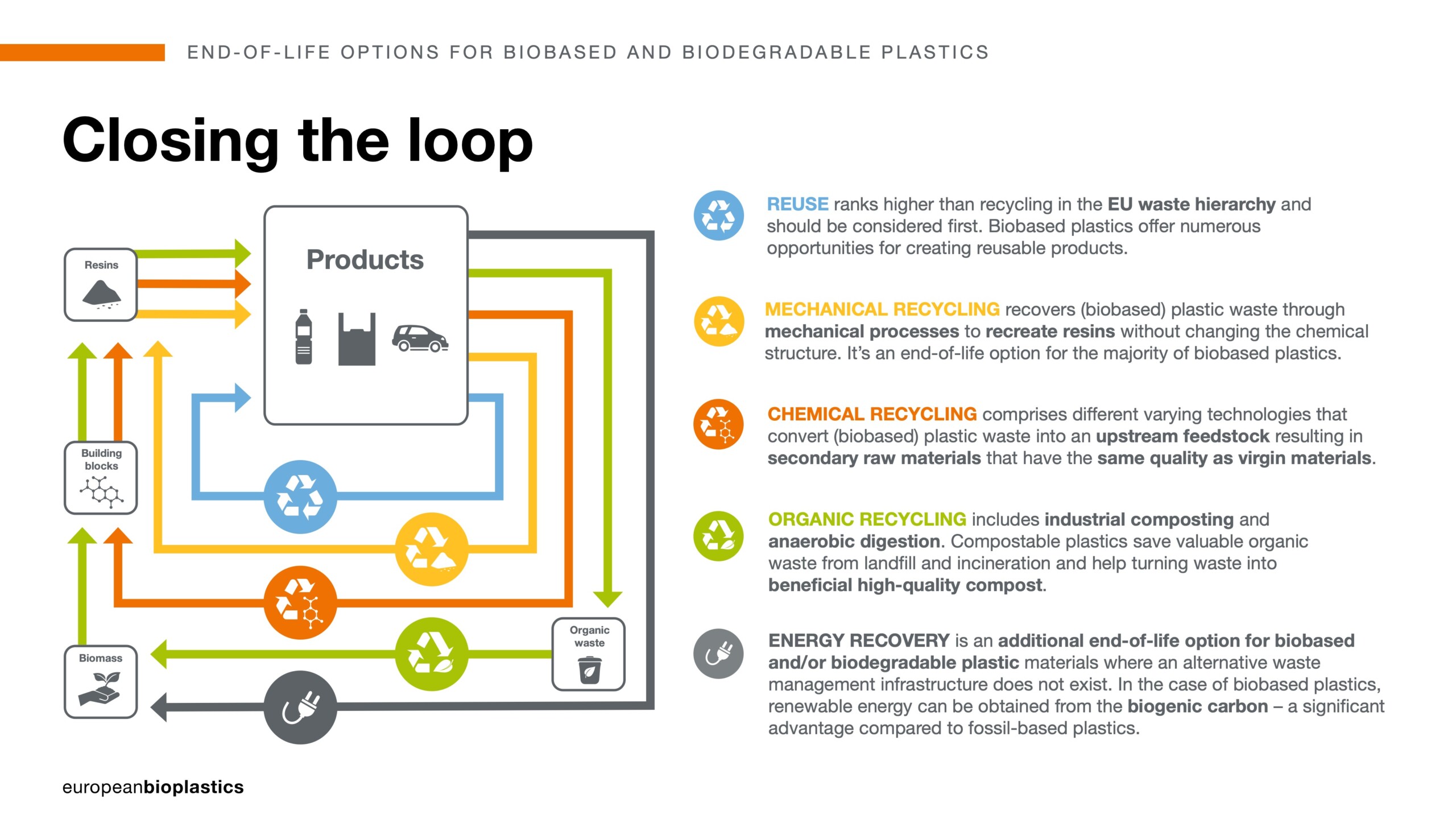EUBP STATEMENT on the EU policy framework on biobased, biodegradable and compostable plastics
In 2022, the European Commission adopted a policy framework on the sourcing, labelling and use of biobased plastics, and the use of biodegradable and compostable plastics. The policy framework was announced in the European Green Deal, Circular Economy Action Plan, and Plastics Strategy with the aim to contribute to a sustainable plastics economy. In particular, it aims to improve the understanding around bioplastics. The framework clarifies where these innovative materials can provide environmental benefits, under which conditions, and for which applications, while holding them to the same strict standards as any other material.
There is currently no EU law in place applying to bioplastics specifically, although some legislation, such as EU Taxonomy, the Single Use Plastics Directive, EU Taxonomy, the Plastic Carrier Bags Directive, the Packaging and Packaging Waste Directive as well as the Waste Framework Directive address some aspects and applications of biobased, biodegradable and compostable plastics. And while the Commission’s Communication for the EU policy framework is non-legislative, i.e., is not legally binding, it reflects the Commission’s views and intentions on these materials and will guide future EU policy making, such as the initiatives on green claims, ecodesign for sustainable products, carbon removal, or microplastics.
EUBP position
European Bioplastics (EUBP) and its members welcome the Commission’s initiative to develop a first comprehensive policy framework on bioplastic materials. The Communication provides an extensive analysis of our sector in Europe and acknowledges advantages and potentials of our materials to provide genuine environmental benefits.
However, despite strong and sound scientific evidence, a few persistent misconceptions remained in the policy framework with regards to land-use, the evaluation of environmental benefits, alleged risks of cross-contamination of waste streams, and biodegradability in different environments.
The policy framework fails to recognise and promote the main advantages of biobased plastics, i.e., the use of renewable resources to produce plastic materials, and their contribution to the transition to a circular and carbon-neutral bioeconomy. The framework also presents a very limiting and overly cautious view on the special property of biodegradability in specific environments, hence neglecting the huge potential, in the case of industrially compostable plastics, for the circular economy and, generally, hampering innovation in this young and promising sector.
We fear that these flaws in the Communication will prevent the Commission from fully embracing the shift to biobased products that are necessary to enable Europe to reduce its dependency on fossil resources and achieve its ambitious climate and circularity goals. We are also concerned that the current approach will stifle rather than stimulate further innovation and market potential of sustainable material solutions in Europe.
Below, EUBP would like to highlight the benefits of bioplastics and clarify some of the shortcomings of the Commission’s Communication.
General comments
The European Commission’s Communication on the EU policy framework on biobased, biodegradable and compostable plastics provides an extensive overview and analysis of the bioplastics sector, including the wide-ranging material solutions and their functionalities, end-of-life options, and contributions to the EU’s ambitions on sustainability, circularity, and climate.
Bioplastics comprise a whole family of different materials. A plastic material is defined as a bioplastic if it is either biobased, biodegradable, or features both properties. Compostable plastics are biodegradable in industrial composting (industrially compostable) or under home composting (home compostable) conditions. It is necessary to always clarify the environment in which biodegradation is supposed to take place and support these claims with certifications and labels based on the according standards.

Biobased plastics can contribute to the EU’s goal to achieve climate neutrality by 2050 by storing and repurposing the carbon from carbon dioxide. Thus, they replace the need for further extraction of fossil resources, while creating a sustainable, competitive advantage for the European industry. Biobased plastics can be recycled in existing (mechanical, organic when industrial compostable, and chemical) recycling infrastructures. They have the environmental advantage to reduce the dependency on fossil resources and to reduce greenhouse gas (GHG) emissions or even be carbon neutral. Moreover, biobased plastics can make a considerable contribution to increased resource efficiency through a closed resource cycle and use cascades.
Industrially compostable plastics provide added value through organic recycling (i.e., industrial composting and anaerobic digestion) as an additional waste treatment option. Industrially compostable plastics are proven to enhance the quality and quantity of the collection and recycling of biowaste (incl. food waste) and, therefore, for the return of carbon to the soil.
All bioplastics can significantly contribute to global sustainability goals, but they do so in different ways. Their wide range of properties highlights the need for distinct and clear communication when referring to a specific material or product when engaging with consumers. It is particularly important to avoid misunderstandings or greenwashing. Hence, the term ‘bioplastics’ without any further explanation should be avoided in B2C communication about a specific product. The same holds true for claims on ‘biodegradability’, which shall only be made by specifying the environment in which biodegradation takes place. Clear and substantiated claims based on existing standards and certification schemes should be made on the biobased content and designated waste management option (e.g., mechanical recycling, organic recycling).

Specific comments
Find out more about the specific benefits of biobased, biodegradable, and compostable plastics and the shortcomings of the Commission’s Communication …
